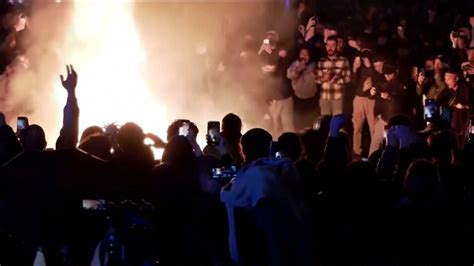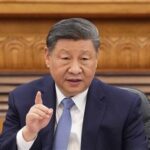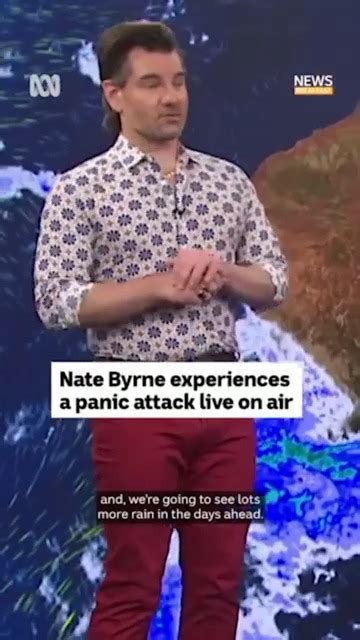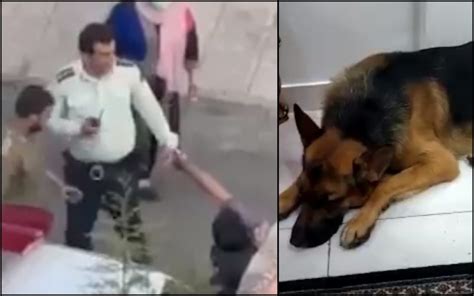
Clashes between police and demonstrators persisted near the Paramount Pictures studio lot in Hollywood for a second consecutive day, resulting in multiple arrests and escalating tensions over a planned ceasefire resolution vote in the Los Angeles City Council. Protesters demanding a ceasefire in the Israel-Hamas conflict blocked entrances to the studio, leading to confrontations with law enforcement officers attempting to clear the area.
Los Angeles, CA – Demonstrations advocating for a ceasefire in the ongoing Israel-Hamas conflict intensified near the Paramount Pictures studio in Hollywood, leading to repeated confrontations between protesters and law enforcement. The protests, primarily focused on pressuring the Los Angeles City Council to pass a resolution calling for a ceasefire, disrupted traffic and studio operations, resulting in multiple arrests and heightening tensions in the area.
The initial demonstration commenced early in the morning, with protesters gathering near the Paramount lot, effectively blocking entrances and disrupting the flow of traffic. Their central demand is that the Los Angeles City Council urgently consider and approve a resolution calling for an immediate and permanent ceasefire in the conflict. The protesters argue that such a resolution would demonstrate the city’s solidarity with those affected by the violence and contribute to broader international efforts to de-escalate the situation.
According to law enforcement officials, the protests quickly escalated as demonstrators refused to disperse despite repeated warnings. The Los Angeles Police Department (LAPD) declared the gathering an unlawful assembly after protesters allegedly began obstructing public thoroughfares and engaging in acts of civil disobedience. Officers in riot gear were deployed to manage the crowd and clear the area, leading to physical altercations and numerous arrests.
“We respect the right to peaceful protest, but we cannot allow demonstrations to disrupt public order and endanger the safety of our residents,” stated an LAPD spokesperson. “We have made multiple attempts to communicate with the protesters and provide them with opportunities to comply with the law. Unfortunately, some individuals chose to engage in unlawful behavior, leaving us with no choice but to take enforcement action.”
Protesters, however, claim that the police response was excessive and unwarranted. They allege that officers used aggressive tactics, including pushing, shoving, and deploying pepper spray, against peaceful demonstrators. Several protesters sustained minor injuries during the clashes, and accusations of police brutality have surfaced on social media.
“We were exercising our constitutional right to protest peacefully,” asserted one demonstrator. “The police response was completely disproportionate to the situation. We were simply trying to make our voices heard and call attention to the urgent need for a ceasefire in Gaza.”
The protests near Paramount Pictures coincided with increasing pressure on the Los Angeles City Council to address the issue of the Israel-Hamas conflict. Several council members have expressed support for a ceasefire resolution, while others remain hesitant, citing concerns about the city’s role in international affairs and the potential for such a resolution to exacerbate divisions within the community.
Councilmember Nithya Raman has been a vocal advocate for the ceasefire resolution, arguing that the city has a moral obligation to speak out against violence and human suffering. “The situation in Gaza is dire, and we cannot remain silent,” Raman stated during a recent city council meeting. “As a city that values human rights and social justice, we must stand in solidarity with those who are calling for an end to the bloodshed.”
However, other council members have expressed reservations about the resolution. Councilmember John Lee, for example, argued that the city council should focus on local issues and avoid taking sides in international conflicts. “Our primary responsibility is to serve the residents of Los Angeles,” Lee stated. “We should not be using our platform to weigh in on complex geopolitical issues that are beyond our control.”
The debate over the ceasefire resolution has deeply divided the Los Angeles community, with passionate arguments on both sides. Supporters of the resolution argue that it would send a powerful message of peace and solidarity, while opponents claim that it would be divisive and unproductive.
The ongoing protests near Paramount Pictures underscore the intensity of the debate and the deep emotions surrounding the Israel-Hamas conflict. As the Los Angeles City Council prepares to vote on the ceasefire resolution, tensions are likely to remain high, and further demonstrations are anticipated. The outcome of the vote could have significant implications for the city’s political landscape and its relationship with its diverse communities.
The situation reflects a broader national and international trend, with protests and demonstrations taking place in cities around the world in response to the ongoing conflict. The demands of the protesters are varied, ranging from calls for a ceasefire to demands for an end to military aid to Israel and increased humanitarian assistance to Gaza.
The complexities of the Israel-Hamas conflict, coupled with deeply held beliefs and political affiliations, make it a highly sensitive and polarizing issue. The challenge for policymakers and community leaders is to find ways to engage in constructive dialogue, address legitimate concerns, and promote understanding and empathy in the face of profound disagreement.
The events in Los Angeles serve as a stark reminder of the far-reaching consequences of international conflicts and the importance of finding peaceful and just solutions to complex geopolitical challenges. The coming days will be crucial as the Los Angeles City Council deliberates on the ceasefire resolution and the community grapples with the deeply divisive issues at stake.
The situation remained fluid late into the evening, with sporadic clashes continuing between protesters and police. Authorities reported that several protesters were taken into custody for various offenses, including unlawful assembly, obstruction of justice, and resisting arrest. The exact number of arrests was not immediately available.
Meanwhile, protest organizers vowed to continue their demonstrations until the Los Angeles City Council takes decisive action on the ceasefire resolution. They have called on supporters to join them in further protests and rallies in the coming days, raising the prospect of continued disruptions and potential confrontations with law enforcement.
The focus now shifts to the Los Angeles City Council, which is expected to hold a crucial vote on the ceasefire resolution in the near future. The outcome of that vote will likely shape the city’s response to the Israel-Hamas conflict and have a lasting impact on its political climate. The eyes of the nation, and indeed the world, are on Los Angeles as it grapples with this complex and emotionally charged issue.
Background on the Israel-Hamas Conflict:
The Israeli-Palestinian conflict is a long-standing and complex issue with roots dating back to the late 19th and early 20th centuries. Key factors contributing to the conflict include competing claims over land, national identity, and religious significance. The establishment of the State of Israel in 1948 and the subsequent displacement of many Palestinians further exacerbated tensions.
Hamas, a Palestinian Sunni-Islamic fundamentalist organization, has controlled the Gaza Strip since 2007. It has engaged in numerous armed conflicts with Israel, including rocket attacks and cross-border incursions. Israel has responded with military operations aimed at dismantling Hamas infrastructure and preventing attacks.
The most recent escalation of the conflict began on October 7, 2023, when Hamas launched a large-scale attack on Israel, killing hundreds of civilians and taking dozens of hostages. Israel responded with a military offensive in Gaza, resulting in widespread destruction and a significant loss of life.
The conflict has drawn international condemnation, with many countries calling for a ceasefire and a negotiated settlement. However, efforts to achieve a lasting peace have been hampered by deep-seated mistrust and a lack of common ground between the parties involved.
The humanitarian situation in Gaza is dire, with millions of people lacking access to basic necessities such as food, water, and medical care. International organizations have warned of a potential humanitarian catastrophe if the conflict continues to escalate.
The Role of Local Governments:
While foreign policy is typically the domain of national governments, local governments can play a role in expressing solidarity with affected communities, advocating for peace and human rights, and providing support to refugees and immigrants.
Many cities around the world have passed resolutions calling for a ceasefire in the Israel-Hamas conflict, reflecting a growing global movement to end the violence and promote a peaceful resolution. These resolutions often serve as a symbolic gesture of support and can help raise awareness of the issue.
However, the decision to pass such resolutions can be controversial, as it can be seen as taking sides in a complex international conflict and potentially alienating segments of the community. Some argue that local governments should focus on local issues and avoid getting involved in foreign affairs.
Despite these concerns, many local officials believe that they have a moral obligation to speak out against injustice and advocate for peace, even if their actions have limited direct impact on the conflict itself. The debate over the role of local governments in international affairs is likely to continue as the world grapples with complex global challenges.
Community Reactions and Divisions:
The Israel-Hamas conflict has sparked strong reactions within communities around the world, including in Los Angeles. The conflict has often exacerbated existing divisions and created new tensions between different groups.
Supporters of Israel often express solidarity with the country and defend its right to self-defense. They may organize rallies and protests to show their support and advocate for continued U.S. aid to Israel.
Supporters of Palestine often express solidarity with the Palestinian people and condemn Israel’s occupation of the West Bank and its blockade of Gaza. They may organize rallies and protests to call for an end to the occupation and demand justice for Palestinians.
The conflict has also led to increased incidents of antisemitism and Islamophobia, as some individuals and groups have used the conflict as an excuse to express hatred and prejudice against Jews and Muslims.
Community leaders have called for calm and restraint, urging people to engage in respectful dialogue and avoid making generalizations or stereotypes about entire groups of people. They have also emphasized the importance of standing in solidarity with victims of hate crimes and discrimination.
The challenge for communities is to find ways to bridge divides and build understanding in the face of deeply held beliefs and political affiliations. This requires open communication, empathy, and a willingness to listen to different perspectives.
Legal Considerations for Protests:
In the United States, the First Amendment to the Constitution protects the right to freedom of speech and assembly, which includes the right to protest peacefully. However, this right is not absolute and can be subject to certain restrictions.
Local governments can impose reasonable time, place, and manner restrictions on protests to ensure public safety and prevent disruptions to public order. These restrictions must be content-neutral, meaning that they cannot be based on the content of the protest.
Examples of permissible restrictions include requiring protesters to obtain permits, limiting the size and duration of protests, and restricting protests in certain areas, such as near hospitals or schools.
Law enforcement officers can arrest protesters who violate the law, such as by engaging in unlawful assembly, blocking traffic, or engaging in acts of violence. However, officers must have probable cause to believe that a crime has been committed before making an arrest.
Protesters have the right to challenge unlawful arrests or restrictions on their right to protest in court.
Impact on Paramount Pictures:
The protests near Paramount Pictures have disrupted the studio’s operations and caused inconvenience to employees and visitors. The studio has issued a statement expressing its commitment to respecting the right to peaceful protest while also emphasizing the importance of maintaining a safe and secure environment for its employees.
The protests have also drawn attention to the studio’s role in the entertainment industry and its potential influence on public opinion. Some protesters have called on Paramount Pictures to use its platform to advocate for a ceasefire in the Israel-Hamas conflict and to promote a more balanced portrayal of the conflict in its programming.
The impact of the protests on Paramount Pictures is likely to depend on the duration and intensity of the demonstrations. The studio will need to balance its commitment to free speech with its responsibility to protect its employees and maintain its business operations.
Future Outlook:
The protests near Paramount Pictures are likely to continue as long as the Israel-Hamas conflict persists and the Los Angeles City Council has not voted on the ceasefire resolution. The intensity of the protests may fluctuate depending on developments in the conflict and the actions of law enforcement.
The outcome of the Los Angeles City Council vote will likely have a significant impact on the city’s political climate and its relationship with its diverse communities. A vote in favor of the ceasefire resolution could be seen as a victory for the protesters and a sign of the city’s commitment to peace and human rights. A vote against the resolution could be seen as a setback for the protesters and could lead to further demonstrations and civil unrest.
Regardless of the outcome of the vote, the Israel-Hamas conflict is likely to remain a divisive issue in Los Angeles for the foreseeable future. Community leaders will need to work together to bridge divides, promote understanding, and create a more inclusive and tolerant society.
The events in Los Angeles serve as a reminder of the interconnectedness of the world and the importance of finding peaceful and just solutions to complex global challenges. The coming days and weeks will be crucial as the city grapples with the deeply divisive issues at stake.
FAQ Section:
1. Why are people protesting near Paramount Pictures in Hollywood?
The protests are taking place to pressure the Los Angeles City Council to pass a resolution calling for a ceasefire in the Israel-Hamas conflict. Protesters chose the location near Paramount Pictures to draw attention to their cause and disrupt business as usual until their demands are met. They believe a ceasefire resolution from the city council would demonstrate solidarity with those affected by the conflict and contribute to international efforts to de-escalate the situation.
2. What actions have been taken by the Los Angeles Police Department (LAPD) during these protests?
The LAPD has declared the protests an unlawful assembly after demonstrators allegedly obstructed public thoroughfares and engaged in acts of civil disobedience. Officers in riot gear have been deployed to manage the crowd and clear the area, resulting in physical altercations and numerous arrests. The LAPD claims their actions are necessary to maintain public order and safety, while protesters allege excessive force and police brutality.
3. What is the Los Angeles City Council’s stance on the ceasefire resolution?
The Los Angeles City Council is divided on the issue of a ceasefire resolution. Some members, like Councilmember Nithya Raman, support the resolution, arguing it is the city’s moral obligation to speak out against violence. Others, like Councilmember John Lee, are hesitant, believing the council should focus on local issues and avoid taking sides in international conflicts. This division reflects a broader debate within the community about the city’s role in international affairs.
4. What are the legal considerations for protesting in Los Angeles?
In the United States, the First Amendment protects the right to peaceful protest. However, local governments can impose reasonable restrictions on protests to ensure public safety and prevent disruptions to public order. These restrictions must be content-neutral. The LAPD can arrest protesters who violate the law, such as by engaging in unlawful assembly or blocking traffic, but must have probable cause for the arrest.
5. How does this conflict impact the local community within Los Angeles?
The Israel-Hamas conflict has sparked strong reactions within communities in Los Angeles, exacerbating existing divisions and creating new tensions. Supporters of Israel and Palestine often hold opposing rallies and protests, leading to increased incidents of antisemitism and Islamophobia. Community leaders are urging calm and respectful dialogue to bridge divides and build understanding in the face of deeply held beliefs.









